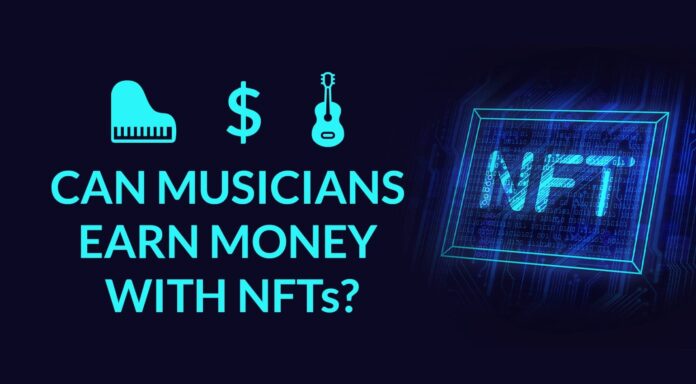The music industry has undergone a significant transformation in the past decade, thanks to advancements in technology and the rise of digital platforms. One of the latest innovations to shake up the music industry is the introduction of Non-Fungible Tokens (NFTs). we will explore the role of NFTs in the music industry and how musicians can monetize their music and fanbase through this new technology.
What are NFTs?
Before we dive into the role of NFTs in the music industry, let’s first understand what they are. NFTs are unique digital assets that are stored on a blockchain, which makes them non-interchangeable and non-replicable. This means that each NFT is one-of-a-kind and cannot be duplicated or replaced.
NFTs can represent anything that has value, including artwork, videos, tweets, and even music. When someone purchases an NFT, they are essentially buying ownership of that unique digital asset. This creates a sense of exclusivity and scarcity, which can increase the perceived value of the asset.
The Role of NFTs in the Music Industry
NFTs have the potential to revolutionize the way musicians monetize their music and engage with their fans. Here are a few ways NFTs can be used in the music industry:
- Selling music as NFTs: Musicians can sell their music as NFTs, which gives fans a unique opportunity to own a piece of the artist’s work. Fans can buy the NFT and gain access to exclusive content such as early access to new music releases, special behind-the-scenes footage, or even personalized experiences such as meet and greets with the artist.
- Selling merchandise as NFTs: Musicians can also sell their merchandise as NFTs, giving fans the opportunity to own a unique piece of memorabilia. This could include things like limited edition vinyl records, concert posters, or even clothing items.
- Royalty collection: NFTs can be used to track royalties and ensure that musicians receive fair compensation for their work. By using blockchain technology, royalties can be tracked and paid out automatically, which can help to streamline the process and reduce the risk of fraud.
- Fan engagement: NFTs can also be used to engage with fans in new and creative ways. Musicians can create NFTs that represent different levels of fan engagement, such as attending a concert, purchasing merchandise, or even sharing the artist’s music on social media. Fans can collect these NFTs and trade them in for exclusive rewards, such as access to VIP events or personalized experiences with the artist.
How Musicians Can Monetize Their Music and Fanbase with NFTs
Now that we’ve covered the role of NFTs in the music industry, let’s dive into how musicians can actually monetize their music and fanbase with NFTs. Here are a few tips to get started:
- Create unique and valuable content: In order to create successful NFTs, musicians need to create content that is both unique and valuable. This could include things like exclusive behind-the-scenes footage, limited edition merchandise, or even personalized experiences with the artist.
- Choose the right platform: There are a number of different NFT platforms available, each with their own strengths and weaknesses. Musicians should carefully consider which platform is the best fit for their needs and goals.
- Engage with fans: NFTs provide an opportunity for musicians to engage with their fans in new and creative ways. By creating NFTs that represent different levels of fan engagement, musicians can incentivize their fans to support their work and build a stronger connection with their audience.
- Experiment and iterate: As with any new technology, there is a learning curve when it comes
NFTs for Fan Engagement
In addition to monetizing their music, musicians can also use NFTs to engage with their fans in new and exciting ways. By creating unique, limited edition NFTs that are tied to special experiences, such as backstage meet-and-greets, private concerts, or personal shoutouts, musicians can offer their fans a level of access and involvement that was previously unavailable.
For example, DJ 3LAU recently sold an NFT album that included experiences like a private listening party, a custom remix, and a one-of-a-kind 3D-printed vinyl record. By purchasing the album, fans not only received exclusive content, but also access to special events and personalized items that cannot be found anywhere else.
NFTs for Live Events
NFTs can also be used to enhance the live event experience. By creating limited edition NFTs that are only available to attendees, event organizers can offer an exclusive, collectible item that commemorates the event and gives attendees a sense of pride and ownership.
For example, the National Basketball Association (NBA) recently released a series of NFTs that celebrate some of the league’s most iconic moments, including Kobe Bryant’s 60-point final game and LeBron James’ championship-winning block. These NFTs not only serve as collectibles for fans, but also allow them to relive some of their favorite moments in NBA history in a unique and immersive way.
Conclusion
The music industry has always been about innovation and creativity, and NFTs offer a new and exciting way for musicians to monetize their work, engage with their fans, and stand out in a crowded market. Whether you’re a new artist looking to make a name for yourself, or an established musician looking to explore new revenue streams, NFTs are a powerful tool that should not be overlooked. By taking the time to understand how NFTs work, and exploring the many different ways they can be used, musicians can unlock a world of new possibilities and opportunities.
However, as with any new technology, it is important to approach NFTs with caution and to do your research before investing time or money into them. While NFTs offer many potential benefits, they also come with certain risks and uncertainties, such as fluctuating market values and unclear legal frameworks. By staying informed and taking a strategic, long-term approach to NFTs, musicians can ensure that they are maximizing the potential of this exciting new technology.



